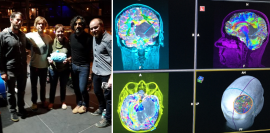For the last five years, I have been actively observing how my brain is working, especially when it makes errors. This is a special skill I acquired after my brain surgery left me with my sensory and information processing deficits. I’ve been thinking about how most people don’t have this ability because their brains work and everything “just happens” naturally. I have written about this multiple times over the years. We’ve learned so much about the brain from people like Phineas Gage whose brain injuries allowed for others to study how things work. I get to do this every day on myself. There is no word in the dictionary for watching your own brain work. The closest concept I can think of is mindfulness, which focuses on observing your thoughts and feelings without judgment. I actually observe not just WHAT my brain is doing, but HOW. I have come up with the term COGNATE to describe what I am doing. I observe. I assess. I often laugh. I find validations of concepts I learned in my cognitive psychology courses and books.
I recently started therapy at a brain injury facility and am learning tips and tricks for being even more aware of what my brain is doing and then actively training it to do things I want it to be doing. I have learned about the concept of neuro-fatigue, which is intellectually new to me but very familiar to me in real life. This is SO MUCH FUN for me. It very much falls in line with my natural cognating.
In a previous post I was questioning whether I identified as a human factors engineer anymore since I was no longer practicing. I would like to say that it became very clear to me immediately that my human factors brain is still there and that is very much who I am. I naturally and automatically assessed the usability of each handout I was given in my welcome packet and during my sessions as well as all the signage and displays that are intended for the user groups of brain damaged people and their caregivers. It seems likely that my application of human factors knowledge will become an integral part of my therapy moving forward and that I may be able to help them as much as they are helping me. Coincidentally, I have always had an interest in designing for special populations and even wrote my graduate school essays on that topic. Then I went in a different direction once in graduate school. Perhaps some things were really meant to be after all…
I suspect I’ll be writing a bit more frequently in the coming months as I continue on this journey.

You mentioned neuro fatigue but didn’t really say what it was. I looked it up and found the answer very interesting. While the clinical definition may apply to brain injury, I find that it also applies to aging. One article gave suggestions that I found very helpful and I tend to do naturally ie prioritize activities and tasks. I think being more conscious of my ability is also helpful. I’m looking forward to seeing where you go with this. Perhaps a job?
LikeLike
The neuro fatigue concept as you describe it, and your use of the term “cognating”, seems to connect very strongly to *executive function*. I have heard similar elements mentioned in studies of dementia, other traumatic brain injuries, “chemo brain” during cancer treatments, and “fibro brain” during under / no medication for fibromyalgia. Yes, you are certainly still a human factors engineer. You are also a participant observer, and an insider researcher. (Some people will even think of you as a hero and role model.). Looking forward to more posts and more communication and collaboration.
LikeLike